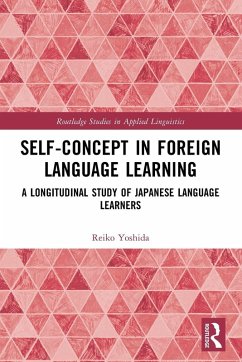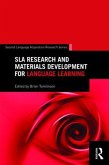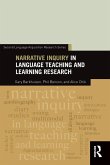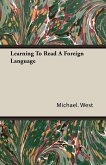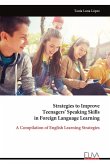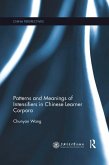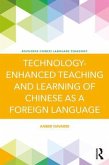Reiko Yoshida
Self-Concept in Foreign Language Learning
A Longitudinal Study of Japanese Language Learners
Reiko Yoshida
Self-Concept in Foreign Language Learning
A Longitudinal Study of Japanese Language Learners
- Broschiertes Buch
- Merkliste
- Auf die Merkliste
- Bewerten Bewerten
- Teilen
- Produkt teilen
- Produkterinnerung
- Produkterinnerung
This book explores self-concept in foreign language (FL) learning, tracing the trajectories of a group of Japanese language learners at an Australian university to illuminate new insights about the factors impacting positive self-concept and implications for language learning more broadly.
Andere Kunden interessierten sich auch für
![SLA Research and Materials Development for Language Learning SLA Research and Materials Development for Language Learning]() SLA Research and Materials Development for Language Learning69,99 €
SLA Research and Materials Development for Language Learning69,99 €![Narrative Inquiry in Language Teaching and Learning Research Narrative Inquiry in Language Teaching and Learning Research]() Gary BarkhuizenNarrative Inquiry in Language Teaching and Learning Research60,99 €
Gary BarkhuizenNarrative Inquiry in Language Teaching and Learning Research60,99 €![A Conversation Analysis Approach to French L2 Learning A Conversation Analysis Approach to French L2 Learning]() Clelia KönigA Conversation Analysis Approach to French L2 Learning55,99 €
Clelia KönigA Conversation Analysis Approach to French L2 Learning55,99 €![Learning To Read A Foreign Language Learning To Read A Foreign Language]() Michael. WestLearning To Read A Foreign Language23,99 €
Michael. WestLearning To Read A Foreign Language23,99 €![Strategies to Improve Teenagers' Speaking Skills in Foreign Language Learning Strategies to Improve Teenagers' Speaking Skills in Foreign Language Learning]() Tania Luna LópezStrategies to Improve Teenagers' Speaking Skills in Foreign Language Learning34,99 €
Tania Luna LópezStrategies to Improve Teenagers' Speaking Skills in Foreign Language Learning34,99 €![Patterns and Meanings of Intensifiers in Chinese Learner Corpora Patterns and Meanings of Intensifiers in Chinese Learner Corpora]() Chunyan WangPatterns and Meanings of Intensifiers in Chinese Learner Corpora55,99 €
Chunyan WangPatterns and Meanings of Intensifiers in Chinese Learner Corpora55,99 €![Technology-Enhanced Teaching and Learning of Chinese as a Foreign Language Technology-Enhanced Teaching and Learning of Chinese as a Foreign Language]() Amber NavarreTechnology-Enhanced Teaching and Learning of Chinese as a Foreign Language49,99 €
Amber NavarreTechnology-Enhanced Teaching and Learning of Chinese as a Foreign Language49,99 €-
-
-
This book explores self-concept in foreign language (FL) learning, tracing the trajectories of a group of Japanese language learners at an Australian university to illuminate new insights about the factors impacting positive self-concept and implications for language learning more broadly.
Produktdetails
- Produktdetails
- Verlag: Routledge
- Seitenzahl: 210
- Erscheinungstermin: 27. Oktober 2025
- Englisch
- Abmessung: 229mm x 152mm x 12mm
- Gewicht: 312g
- ISBN-13: 9781032484846
- ISBN-10: 1032484845
- Artikelnr.: 75422438
- Herstellerkennzeichnung
- Libri GmbH
- Europaallee 1
- 36244 Bad Hersfeld
- gpsr@libri.de
- Verlag: Routledge
- Seitenzahl: 210
- Erscheinungstermin: 27. Oktober 2025
- Englisch
- Abmessung: 229mm x 152mm x 12mm
- Gewicht: 312g
- ISBN-13: 9781032484846
- ISBN-10: 1032484845
- Artikelnr.: 75422438
- Herstellerkennzeichnung
- Libri GmbH
- Europaallee 1
- 36244 Bad Hersfeld
- gpsr@libri.de
Reiko Yoshida is Lecturer in Japanese at the University of South Australia and a member of Centre for Research in Educational and Social Inclusion.
List of figures
List of tables
Acknowledgements
Chapter 1: Introduction and background of the study
Self in second/foreign language acquisition
Self-concept and other self-related constructs
Conceptual models of academic self-concept
The subject-specificity of self-concept
Self-concept and achievement
Internal and external (social) comparisons
Internal/external comparisons and affect
Big-fish-little-pond effect
Internal/external comparisons and goals
Feedback from significant others
Attribution of success and failure
Self-concept in the transition to different learning contexts
Aim and overview of the book
Chapter 2: Foreign language self-concepts, beliefs and ideal second
language selves
Mercer's internal/external frames of reference in foreign language
self-concept formation
Internal frames of reference for FL self-concept formation
External frames of reference for FL self-concept formation
Learners' self-presentations in second and foreign languages
The ideal L2 self and the ought-to L2 self
Learners' beliefs about language learning
Studies about self-concept in foreign language learning
Previous research on study abroad
Factors that influence learners' experiences in study abroad and their
perceptions of those experiences
Environmental contexts in study abroad and interactions in the target
language
Learners' self-related issues in study abroad
Summary of the chapter
Chapter 3: Context of the study and methodology
Context of the present study
Participants
Methodologies of data collection and analysis
Outline of data collection
Diary writing
Interviews
Classroom recording and observation
Data analysis
Chapter 4: Foreign language self-concept upon transition to university
Hesitance: A rocky start for Adrian, Jason and Sandra
Confidence embodied: Betty's smooth start
Speaking up: Changes in the FL self-concepts of Adrian, Jason and Sandra
Betty's disappointment: Her inability to develop a more positive FL
self-concept
Learners' FL self-concepts, ideal L2 selves and beliefs about language
learning in transition periods to university
Summary of the chapter
Chapter 5: Foreign language self-concept during and after study abroad
Critical experience: Sandra's FL self-concept during study abroad
Maintenance of motivation: Sandra's FL self-concept after study abroad
Harmony between a belief and a learning environment: Zac's FL self-concept
during study abroad
Conflict between a belief and a learning environment: Zac's FL self-concept
after study abroad
Strong hesitance to speak Japanese: Joan's FL self-concept in the classroom
Building confidence to speak: Joan's FL self-concept during study abroad
Learners' FL self-concepts, ideal L2 selves and beliefs about language
learning during and after study abroad
Summary of the chapter
Chapter 6: Conclusion
The dynamic and complex nature of FL self-concept
The development of positive FL self-concept
Emotions and FL self-concept
The researcher's reflexivity
Teaching implications
Limitations of the study and future studies about FL self-concept
Appendices
Appendix A: Questionnaire
Appendix B: Instructions for diary writing
Appendix C: General questions in interviews
Appendix D: Observations noted in the classroom
Appendix E: Transcription conventions
Index
List of tables
Acknowledgements
Chapter 1: Introduction and background of the study
Self in second/foreign language acquisition
Self-concept and other self-related constructs
Conceptual models of academic self-concept
The subject-specificity of self-concept
Self-concept and achievement
Internal and external (social) comparisons
Internal/external comparisons and affect
Big-fish-little-pond effect
Internal/external comparisons and goals
Feedback from significant others
Attribution of success and failure
Self-concept in the transition to different learning contexts
Aim and overview of the book
Chapter 2: Foreign language self-concepts, beliefs and ideal second
language selves
Mercer's internal/external frames of reference in foreign language
self-concept formation
Internal frames of reference for FL self-concept formation
External frames of reference for FL self-concept formation
Learners' self-presentations in second and foreign languages
The ideal L2 self and the ought-to L2 self
Learners' beliefs about language learning
Studies about self-concept in foreign language learning
Previous research on study abroad
Factors that influence learners' experiences in study abroad and their
perceptions of those experiences
Environmental contexts in study abroad and interactions in the target
language
Learners' self-related issues in study abroad
Summary of the chapter
Chapter 3: Context of the study and methodology
Context of the present study
Participants
Methodologies of data collection and analysis
Outline of data collection
Diary writing
Interviews
Classroom recording and observation
Data analysis
Chapter 4: Foreign language self-concept upon transition to university
Hesitance: A rocky start for Adrian, Jason and Sandra
Confidence embodied: Betty's smooth start
Speaking up: Changes in the FL self-concepts of Adrian, Jason and Sandra
Betty's disappointment: Her inability to develop a more positive FL
self-concept
Learners' FL self-concepts, ideal L2 selves and beliefs about language
learning in transition periods to university
Summary of the chapter
Chapter 5: Foreign language self-concept during and after study abroad
Critical experience: Sandra's FL self-concept during study abroad
Maintenance of motivation: Sandra's FL self-concept after study abroad
Harmony between a belief and a learning environment: Zac's FL self-concept
during study abroad
Conflict between a belief and a learning environment: Zac's FL self-concept
after study abroad
Strong hesitance to speak Japanese: Joan's FL self-concept in the classroom
Building confidence to speak: Joan's FL self-concept during study abroad
Learners' FL self-concepts, ideal L2 selves and beliefs about language
learning during and after study abroad
Summary of the chapter
Chapter 6: Conclusion
The dynamic and complex nature of FL self-concept
The development of positive FL self-concept
Emotions and FL self-concept
The researcher's reflexivity
Teaching implications
Limitations of the study and future studies about FL self-concept
Appendices
Appendix A: Questionnaire
Appendix B: Instructions for diary writing
Appendix C: General questions in interviews
Appendix D: Observations noted in the classroom
Appendix E: Transcription conventions
Index
List of figures
List of tables
Acknowledgements
Chapter 1: Introduction and background of the study
Self in second/foreign language acquisition
Self-concept and other self-related constructs
Conceptual models of academic self-concept
The subject-specificity of self-concept
Self-concept and achievement
Internal and external (social) comparisons
Internal/external comparisons and affect
Big-fish-little-pond effect
Internal/external comparisons and goals
Feedback from significant others
Attribution of success and failure
Self-concept in the transition to different learning contexts
Aim and overview of the book
Chapter 2: Foreign language self-concepts, beliefs and ideal second language selves
Mercer's internal/external frames of reference in foreign language self-concept formation
Internal frames of reference for FL self-concept formation
External frames of reference for FL self-concept formation
Learners' self-presentations in second and foreign languages
The ideal L2 self and the ought-to L2 self
Learners' beliefs about language learning
Studies about self-concept in foreign language learning
Previous research on study abroad
Factors that influence learners' experiences in study abroad and their perceptions of those experiences
Environmental contexts in study abroad and interactions in the target language
Learners' self-related issues in study abroad
Summary of the chapter
Chapter 3: Context of the study and methodology
Context of the present study
Participants
Methodologies of data collection and analysis
Outline of data collection
Diary writing
Interviews
Classroom recording and observation
Data analysis
Chapter 4: Foreign language self-concept upon transition to university
Hesitance: A rocky start for Adrian, Jason and Sandra
Confidence embodied: Betty's smooth start
Speaking up: Changes in the FL self-concepts of Adrian, Jason and Sandra
Betty's disappointment: Her inability to develop a more positive FL self-concept
Learners' FL self-concepts, ideal L2 selves and beliefs about language learning in transition periods to university
Summary of the chapter
Chapter 5: Foreign language self-concept during and after study abroad
Critical experience: Sandra's FL self-concept during study abroad
Maintenance of motivation: Sandra's FL self-concept after study abroad
Harmony between a belief and a learning environment: Zac's FL self-concept during study abroad
Conflict between a belief and a learning environment: Zac's FL self-concept after study abroad
Strong hesitance to speak Japanese: Joan's FL self-concept in the classroom
Building confidence to speak: Joan's FL self-concept during study abroad
Learners' FL self-concepts, ideal L2 selves and beliefs about language learning during and after study abroad
Summary of the chapter
Chapter 6: Conclusion
The dynamic and complex nature of FL self-concept
The development of positive FL self-concept
Emotions and FL self-concept
The researcher's reflexivity
Teaching implications
Limitations of the study and future studies about FL self-concept
Appendices
Appendix A: Questionnaire
Appendix B: Instructions for diary writing
Appendix C: General questions in interviews
Appendix D: Observations noted in the classroom
Appendix E: Transcription conventions
Index
List of tables
Acknowledgements
Chapter 1: Introduction and background of the study
Self in second/foreign language acquisition
Self-concept and other self-related constructs
Conceptual models of academic self-concept
The subject-specificity of self-concept
Self-concept and achievement
Internal and external (social) comparisons
Internal/external comparisons and affect
Big-fish-little-pond effect
Internal/external comparisons and goals
Feedback from significant others
Attribution of success and failure
Self-concept in the transition to different learning contexts
Aim and overview of the book
Chapter 2: Foreign language self-concepts, beliefs and ideal second language selves
Mercer's internal/external frames of reference in foreign language self-concept formation
Internal frames of reference for FL self-concept formation
External frames of reference for FL self-concept formation
Learners' self-presentations in second and foreign languages
The ideal L2 self and the ought-to L2 self
Learners' beliefs about language learning
Studies about self-concept in foreign language learning
Previous research on study abroad
Factors that influence learners' experiences in study abroad and their perceptions of those experiences
Environmental contexts in study abroad and interactions in the target language
Learners' self-related issues in study abroad
Summary of the chapter
Chapter 3: Context of the study and methodology
Context of the present study
Participants
Methodologies of data collection and analysis
Outline of data collection
Diary writing
Interviews
Classroom recording and observation
Data analysis
Chapter 4: Foreign language self-concept upon transition to university
Hesitance: A rocky start for Adrian, Jason and Sandra
Confidence embodied: Betty's smooth start
Speaking up: Changes in the FL self-concepts of Adrian, Jason and Sandra
Betty's disappointment: Her inability to develop a more positive FL self-concept
Learners' FL self-concepts, ideal L2 selves and beliefs about language learning in transition periods to university
Summary of the chapter
Chapter 5: Foreign language self-concept during and after study abroad
Critical experience: Sandra's FL self-concept during study abroad
Maintenance of motivation: Sandra's FL self-concept after study abroad
Harmony between a belief and a learning environment: Zac's FL self-concept during study abroad
Conflict between a belief and a learning environment: Zac's FL self-concept after study abroad
Strong hesitance to speak Japanese: Joan's FL self-concept in the classroom
Building confidence to speak: Joan's FL self-concept during study abroad
Learners' FL self-concepts, ideal L2 selves and beliefs about language learning during and after study abroad
Summary of the chapter
Chapter 6: Conclusion
The dynamic and complex nature of FL self-concept
The development of positive FL self-concept
Emotions and FL self-concept
The researcher's reflexivity
Teaching implications
Limitations of the study and future studies about FL self-concept
Appendices
Appendix A: Questionnaire
Appendix B: Instructions for diary writing
Appendix C: General questions in interviews
Appendix D: Observations noted in the classroom
Appendix E: Transcription conventions
Index
List of figures
List of tables
Acknowledgements
Chapter 1: Introduction and background of the study
Self in second/foreign language acquisition
Self-concept and other self-related constructs
Conceptual models of academic self-concept
The subject-specificity of self-concept
Self-concept and achievement
Internal and external (social) comparisons
Internal/external comparisons and affect
Big-fish-little-pond effect
Internal/external comparisons and goals
Feedback from significant others
Attribution of success and failure
Self-concept in the transition to different learning contexts
Aim and overview of the book
Chapter 2: Foreign language self-concepts, beliefs and ideal second
language selves
Mercer's internal/external frames of reference in foreign language
self-concept formation
Internal frames of reference for FL self-concept formation
External frames of reference for FL self-concept formation
Learners' self-presentations in second and foreign languages
The ideal L2 self and the ought-to L2 self
Learners' beliefs about language learning
Studies about self-concept in foreign language learning
Previous research on study abroad
Factors that influence learners' experiences in study abroad and their
perceptions of those experiences
Environmental contexts in study abroad and interactions in the target
language
Learners' self-related issues in study abroad
Summary of the chapter
Chapter 3: Context of the study and methodology
Context of the present study
Participants
Methodologies of data collection and analysis
Outline of data collection
Diary writing
Interviews
Classroom recording and observation
Data analysis
Chapter 4: Foreign language self-concept upon transition to university
Hesitance: A rocky start for Adrian, Jason and Sandra
Confidence embodied: Betty's smooth start
Speaking up: Changes in the FL self-concepts of Adrian, Jason and Sandra
Betty's disappointment: Her inability to develop a more positive FL
self-concept
Learners' FL self-concepts, ideal L2 selves and beliefs about language
learning in transition periods to university
Summary of the chapter
Chapter 5: Foreign language self-concept during and after study abroad
Critical experience: Sandra's FL self-concept during study abroad
Maintenance of motivation: Sandra's FL self-concept after study abroad
Harmony between a belief and a learning environment: Zac's FL self-concept
during study abroad
Conflict between a belief and a learning environment: Zac's FL self-concept
after study abroad
Strong hesitance to speak Japanese: Joan's FL self-concept in the classroom
Building confidence to speak: Joan's FL self-concept during study abroad
Learners' FL self-concepts, ideal L2 selves and beliefs about language
learning during and after study abroad
Summary of the chapter
Chapter 6: Conclusion
The dynamic and complex nature of FL self-concept
The development of positive FL self-concept
Emotions and FL self-concept
The researcher's reflexivity
Teaching implications
Limitations of the study and future studies about FL self-concept
Appendices
Appendix A: Questionnaire
Appendix B: Instructions for diary writing
Appendix C: General questions in interviews
Appendix D: Observations noted in the classroom
Appendix E: Transcription conventions
Index
List of tables
Acknowledgements
Chapter 1: Introduction and background of the study
Self in second/foreign language acquisition
Self-concept and other self-related constructs
Conceptual models of academic self-concept
The subject-specificity of self-concept
Self-concept and achievement
Internal and external (social) comparisons
Internal/external comparisons and affect
Big-fish-little-pond effect
Internal/external comparisons and goals
Feedback from significant others
Attribution of success and failure
Self-concept in the transition to different learning contexts
Aim and overview of the book
Chapter 2: Foreign language self-concepts, beliefs and ideal second
language selves
Mercer's internal/external frames of reference in foreign language
self-concept formation
Internal frames of reference for FL self-concept formation
External frames of reference for FL self-concept formation
Learners' self-presentations in second and foreign languages
The ideal L2 self and the ought-to L2 self
Learners' beliefs about language learning
Studies about self-concept in foreign language learning
Previous research on study abroad
Factors that influence learners' experiences in study abroad and their
perceptions of those experiences
Environmental contexts in study abroad and interactions in the target
language
Learners' self-related issues in study abroad
Summary of the chapter
Chapter 3: Context of the study and methodology
Context of the present study
Participants
Methodologies of data collection and analysis
Outline of data collection
Diary writing
Interviews
Classroom recording and observation
Data analysis
Chapter 4: Foreign language self-concept upon transition to university
Hesitance: A rocky start for Adrian, Jason and Sandra
Confidence embodied: Betty's smooth start
Speaking up: Changes in the FL self-concepts of Adrian, Jason and Sandra
Betty's disappointment: Her inability to develop a more positive FL
self-concept
Learners' FL self-concepts, ideal L2 selves and beliefs about language
learning in transition periods to university
Summary of the chapter
Chapter 5: Foreign language self-concept during and after study abroad
Critical experience: Sandra's FL self-concept during study abroad
Maintenance of motivation: Sandra's FL self-concept after study abroad
Harmony between a belief and a learning environment: Zac's FL self-concept
during study abroad
Conflict between a belief and a learning environment: Zac's FL self-concept
after study abroad
Strong hesitance to speak Japanese: Joan's FL self-concept in the classroom
Building confidence to speak: Joan's FL self-concept during study abroad
Learners' FL self-concepts, ideal L2 selves and beliefs about language
learning during and after study abroad
Summary of the chapter
Chapter 6: Conclusion
The dynamic and complex nature of FL self-concept
The development of positive FL self-concept
Emotions and FL self-concept
The researcher's reflexivity
Teaching implications
Limitations of the study and future studies about FL self-concept
Appendices
Appendix A: Questionnaire
Appendix B: Instructions for diary writing
Appendix C: General questions in interviews
Appendix D: Observations noted in the classroom
Appendix E: Transcription conventions
Index
List of figures
List of tables
Acknowledgements
Chapter 1: Introduction and background of the study
Self in second/foreign language acquisition
Self-concept and other self-related constructs
Conceptual models of academic self-concept
The subject-specificity of self-concept
Self-concept and achievement
Internal and external (social) comparisons
Internal/external comparisons and affect
Big-fish-little-pond effect
Internal/external comparisons and goals
Feedback from significant others
Attribution of success and failure
Self-concept in the transition to different learning contexts
Aim and overview of the book
Chapter 2: Foreign language self-concepts, beliefs and ideal second language selves
Mercer's internal/external frames of reference in foreign language self-concept formation
Internal frames of reference for FL self-concept formation
External frames of reference for FL self-concept formation
Learners' self-presentations in second and foreign languages
The ideal L2 self and the ought-to L2 self
Learners' beliefs about language learning
Studies about self-concept in foreign language learning
Previous research on study abroad
Factors that influence learners' experiences in study abroad and their perceptions of those experiences
Environmental contexts in study abroad and interactions in the target language
Learners' self-related issues in study abroad
Summary of the chapter
Chapter 3: Context of the study and methodology
Context of the present study
Participants
Methodologies of data collection and analysis
Outline of data collection
Diary writing
Interviews
Classroom recording and observation
Data analysis
Chapter 4: Foreign language self-concept upon transition to university
Hesitance: A rocky start for Adrian, Jason and Sandra
Confidence embodied: Betty's smooth start
Speaking up: Changes in the FL self-concepts of Adrian, Jason and Sandra
Betty's disappointment: Her inability to develop a more positive FL self-concept
Learners' FL self-concepts, ideal L2 selves and beliefs about language learning in transition periods to university
Summary of the chapter
Chapter 5: Foreign language self-concept during and after study abroad
Critical experience: Sandra's FL self-concept during study abroad
Maintenance of motivation: Sandra's FL self-concept after study abroad
Harmony between a belief and a learning environment: Zac's FL self-concept during study abroad
Conflict between a belief and a learning environment: Zac's FL self-concept after study abroad
Strong hesitance to speak Japanese: Joan's FL self-concept in the classroom
Building confidence to speak: Joan's FL self-concept during study abroad
Learners' FL self-concepts, ideal L2 selves and beliefs about language learning during and after study abroad
Summary of the chapter
Chapter 6: Conclusion
The dynamic and complex nature of FL self-concept
The development of positive FL self-concept
Emotions and FL self-concept
The researcher's reflexivity
Teaching implications
Limitations of the study and future studies about FL self-concept
Appendices
Appendix A: Questionnaire
Appendix B: Instructions for diary writing
Appendix C: General questions in interviews
Appendix D: Observations noted in the classroom
Appendix E: Transcription conventions
Index
List of tables
Acknowledgements
Chapter 1: Introduction and background of the study
Self in second/foreign language acquisition
Self-concept and other self-related constructs
Conceptual models of academic self-concept
The subject-specificity of self-concept
Self-concept and achievement
Internal and external (social) comparisons
Internal/external comparisons and affect
Big-fish-little-pond effect
Internal/external comparisons and goals
Feedback from significant others
Attribution of success and failure
Self-concept in the transition to different learning contexts
Aim and overview of the book
Chapter 2: Foreign language self-concepts, beliefs and ideal second language selves
Mercer's internal/external frames of reference in foreign language self-concept formation
Internal frames of reference for FL self-concept formation
External frames of reference for FL self-concept formation
Learners' self-presentations in second and foreign languages
The ideal L2 self and the ought-to L2 self
Learners' beliefs about language learning
Studies about self-concept in foreign language learning
Previous research on study abroad
Factors that influence learners' experiences in study abroad and their perceptions of those experiences
Environmental contexts in study abroad and interactions in the target language
Learners' self-related issues in study abroad
Summary of the chapter
Chapter 3: Context of the study and methodology
Context of the present study
Participants
Methodologies of data collection and analysis
Outline of data collection
Diary writing
Interviews
Classroom recording and observation
Data analysis
Chapter 4: Foreign language self-concept upon transition to university
Hesitance: A rocky start for Adrian, Jason and Sandra
Confidence embodied: Betty's smooth start
Speaking up: Changes in the FL self-concepts of Adrian, Jason and Sandra
Betty's disappointment: Her inability to develop a more positive FL self-concept
Learners' FL self-concepts, ideal L2 selves and beliefs about language learning in transition periods to university
Summary of the chapter
Chapter 5: Foreign language self-concept during and after study abroad
Critical experience: Sandra's FL self-concept during study abroad
Maintenance of motivation: Sandra's FL self-concept after study abroad
Harmony between a belief and a learning environment: Zac's FL self-concept during study abroad
Conflict between a belief and a learning environment: Zac's FL self-concept after study abroad
Strong hesitance to speak Japanese: Joan's FL self-concept in the classroom
Building confidence to speak: Joan's FL self-concept during study abroad
Learners' FL self-concepts, ideal L2 selves and beliefs about language learning during and after study abroad
Summary of the chapter
Chapter 6: Conclusion
The dynamic and complex nature of FL self-concept
The development of positive FL self-concept
Emotions and FL self-concept
The researcher's reflexivity
Teaching implications
Limitations of the study and future studies about FL self-concept
Appendices
Appendix A: Questionnaire
Appendix B: Instructions for diary writing
Appendix C: General questions in interviews
Appendix D: Observations noted in the classroom
Appendix E: Transcription conventions
Index
"Reiko Yoshida's study is richly grounded in qualitative data from learners of Japanese as they transition from secondary school to university, study abroad, and beyond. It illuminates the complex interplay between students' beliefs about language learning and their evolving self-concepts as language learners, as they negotiate new learning contexts, struggle with challenges, and exercise agency in pursuit of their ideal selves. This deeply engaging book will be of interest to all those concerned with understanding or researching the role of the self-concept in language learning."
- Professor Ema Ushioda, University of Warwick, UK
- Professor Ema Ushioda, University of Warwick, UK

